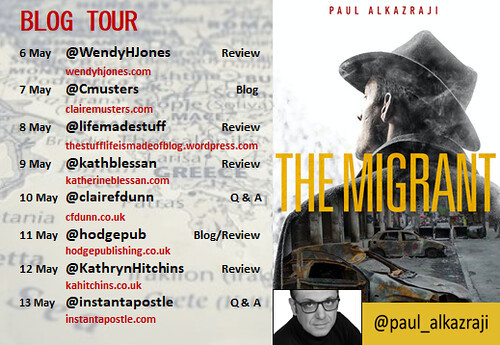Paul Alkazraji's Blog - Posts Tagged "greece"
Thriller is set against background of Turkey’s inner conflicts
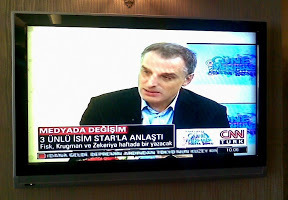
A British writer has had a thriller published that draws on Turkey’s recent inner conflicts and his experiences of the Balkans since he left the UK to live and work in Albania in 2003.
Set in Turkey, Greece and Albania, the story is about a man’s attempt to publish a book, and whether he will make it against setbacks and a danger that is approaching him with deadly intentions. “It is set against a background of church persecution in Turkey, murders and other true events there, including news revelations about the ‘Ergenekon’: a secret cabal plotting to destabilise the country for their own political objectives,” he says.
Entitled ‘The Silencer’, it has scenes in Istanbul and also tells the story of how one young man sets out on a mission of vengeance, caught up in the conflicts between Turkey’s secularists, Islamists and ruling conservative government.
“I hope I’ve been able to evoke some of the atmospheres of each of the Balkan countries, and tell a knife-edge story that grips to the final pages,” he says.
The author, Paul Alkazraji, worked as a freelance journalist in the Nineties and wrote the biographies of Bristol Rovers ex-football hooligan, Dave Jeal, and of Bristol missionary Ian Loring ‘Christ and the Kalashnikov’, as well as travel articles for London’s ‘The Independent’. Since 2004, he has run a magazine for churches in Albania.
“Initially, I went to Albania as a reporter just before the Kosovo crisis,” he says. “I went back again to write an earlier book and met my future wife there. We returned together to live in Albania in 2003, and we both still serve there with the local church. You never can tell how a single trip can change the course of your life!”
The Silencer
Published on June 03, 2013 09:04
•
Tags:
albania, ergenekon, greece, istanbul, justice-and-development-party, malatya, persecution, secularists, the-church, turkey
A story of love and adventure in ancient Greece
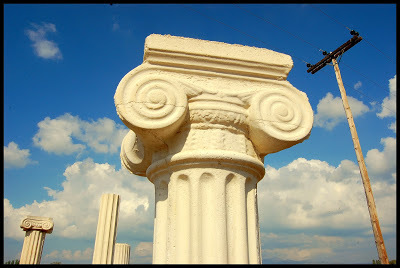
Pic. P. Wilson
Interview with Dan Truitt, author of ‘Spartan’s Daughter’.
By Paul Alkazraji, author of The Silencer
Tell us a little about yourself.
My full name is Daniel Perry Truitt. My maternal grandfather was a Greek immigrant to the US named Periandros Harbelis, or Perry for short. I was born in 1954 and raised in the Chicago suburbs. I grew up Catholic, became an atheist and a hippie around 1970, and then became a Christian in 1984 after studying the book of Acts. That was while simultaneously following Anthony Hopkins in a little-known role of his as St. Paul in Peter and Paul, a teleplay broadcast during Holy Week 1984. Shortly after that, I determined that I had been called to Greece. My best friend in the US jokes that I “came to Greece to give the Greeks the Bible in their own language.”
Tell us about your new book.
Spartan’s Daughter is the story of a nineteen year-old girl who leaves Sparta, her native city-state, because her options there as a woman are limited. According to Spartan tradition, she must submit in marriage to the first man who can successfully ‘kidnap’ her! So she travels only at night, by foot, to Athens, where she has a great-uncle who will look after her. She doesn’t know that he is seriously ill and will be dead by the time she arrives. It’s the first of September, 490 BC. On the ninth of September, the battle of Marathon will be fought. She’ll be the only Spartan, and the only woman, to participate, albeit in a very small but very crucial way. Spartan’s Daughter is primarily a love story, with some adventure, a little violence, and some history thrown in.
Is there an aspect of it you are particularly pleased with?
One thing that turned out in a way I really liked and didn’t expect was the way the characters talked and acted. I’ve been in Greece nearly 25 years and I know how Greeks think and act, and why. It was easy transferring those behaviour patterns to 490 BC. After all, Greece has one of the longest unbroken cultural lines in world history. I actually got this idea from Woody Allen, in his movie Mighty Aphrodite. He opens the film with a classical face mask-wearing Greek chorus and narrator, but in the background he’s playing modern bouzouki music. I thought that was really clever.
Share with us a sentence of your choice from it.
This one illustrates the way I have Greeks thinking about their gods. Morpheus is the god of dreams. Kalliope, the main character, is dreaming. She knows that Morpheus is the man running the projector of her dreams:
“To Kalliope, Morpheus was rather like an insane but brilliant artist who was constantly coming up with bizarre situations and pictures which no one else possibly could.”
Tell us about something you like or dislike in one of your characters.
Something I like: I have the male protagonist, an Athenian mercenary named Alexandros, not be flawlessly handsome. He would be so were it not for a deep, nasty scar running from his eyebrow down through the bridge of his nose from an opponents’ sword. In moments of distress his hand goes to this scar and touches it.
Fiction writers put characters in dramatic situations ultimately to ‘say’ something. What are you saying in your latest work?
I don’t like Christian fiction in most of its modern forms. By the same token there is great need for Christian verities (true principles) to be subtly taught in the arts the same way godless atheism is. So this is an attempt to do this. I’m talking about those like physical and moral courage, sexual fidelity, and a love of the freedom our Creator gave us to be who we are. But even then I tried to tone it down a little and make this primarily a love/adventure story. I can’t stand didactic fiction, which is my main problem with Christian fiction. The only Christian novel I would give to a non-believer is Francine Rivers’s Redeeming Love, which is a beautiful 19th century take on the prophet Hosea and his unfaithful prostitute wife.
How does your faith influence your writing?
I’ve understood that God gave me storytelling and descriptive abilities to help people grasp what existence is all about. Our goal as Christians is to ultimately bring glory to our Maker. There is absolutely no point to my writing a single sentence if Biblical values do not percolate through it.
What aspect of the craft of writing do you find most enjoyable?
Watching a first draft unfold. It’s a blast, as long as you know how things will end. A second enjoyable thing is just playing with my imagination, watching two disparate ideas collide and create the germ of a story.
What books or authors do you like to read?
I love my Kindle. I just counted eighteen books that I’m reading on it right now. The last couple of years I like history and biography more and more. A good biography will have me visualizing a person, time and place pretty vividly. It’s like taking a trip in a time machine. Favourites include James Lee Burke, Stephen King, John Grisham, Flannery O’Conner, Michael Connelly, William Faulkner, Andrew Klavan, JRR Tolkien, David McCullough, and Shelby Foote. Five of those are from the American south, BTW.
Tell us about something you’ve read recently that moved you.
That’s probably a history of the American Dust Bowl in the 1930’s called ‘The Worst Hard Time’... absolutely unbelievable suffering. It changed my politics. People then had no social safety net whatsoever, and were left alone to sink or swim on their own. The other side of that coin is that the farmers in Oklahoma and the Texas Panhandle created the Dust Bowl by over-ploughing the prairie and expecting a couple decades of unusually rainy weather to continue indefinitely. They got greedy, especially with wheat prices going through the roof because of WWI. At any rate, for most of us that safety net is in place as a refuge of last resort.
What are you most thankful for in life?
Eternal life of course.
What makes you laugh?
People falling down... I’m laughing now just thinking of it.
***
Dan Truitt has written four novels during the last ten years. His novel Spartan’s Daughter is available to read and download here.
http://turnerjunction.blogspot.al/
Published on November 14, 2013 09:53
•
Tags:
athens, christian, greece, james-lee-burke, marathon, morpheus, sparta, thessaloniki, woody-allen
'The Silencer' giveaways coming... and 'Radio Radio'
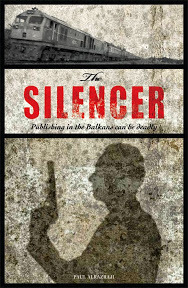
Alternative cover design for 'The Silencer' (unused)
Watch out for more giveaways of 'The Silencer' on Goodreads this summer in the UK, USA, Albania, Greece and Turkey. In the meantime, here's what two readers have said recently about it elsewhere...
Couldn't put it down
26 May 2014
'Really enjoyed this well written thriller. Having visited Albania myself it succeeded in capturing the true essence of the country. A real page turner.' Anne on Amazon UK.
'Paul Alkazraji does a great job at crafting a story that has both an exciting plot and time spent on developing the characters. It is well-paced, and difficult to put down but the author does not skimp on description. The back-drop of Albania especially is almost a character itself, as the author vividly describes what are clearly familiar aspects of culture and geography. The rhythm of life of the main characters is very realistic and in the end as the pace increases, the reader really cares about these people. I also found the inclusion of faith in the narrative handled realistically and sensitively. It would appeal to a wide audience of lovers of fiction and travel writing.' Anna on Amazon UK.
Radio Interview
Radio interview at Branch FM UK on 26/06/2014... Chatting about Albania, books, Norman Wisdom, ex-football hooligan Dave Jeal and 'The Silencer'...
Click here:
http://www.mixcloud.com/Branchfm/paul...
Published on June 08, 2014 09:49
•
Tags:
adventure, albania, christian, england, ergenekon, greece, mission, persecution, suspense, the-church, thessaloniki, thriller, travel, turkey
Behind the scenes... and personal
'The Silencer’ 2nd Anniversary of publication.
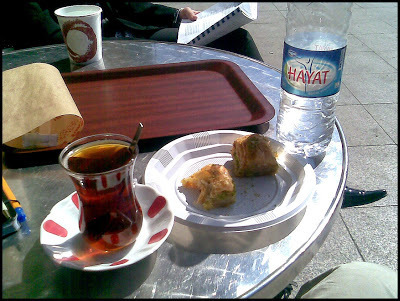
Doing table top research on the Ataturk Boulevard, Istanbul,
just watching...
(Here Sheref Dushman meets contacts and prepares to depart for Greece from Sirkeci Railway Station.)
During the field research I discovered that the 'Friendship Express' service between Istanbul and Thessaloniki had stopped altogether just a month before I wanted to take it. So I had to work out an alternative way of experiencing the journey Sheref makes. My wife and I found a coach trip for Istanbul from Albania on Women's Day 2011, and travelled roughly along the same route through the night, at times parallel to the railway lines. The excursion degenerated into chaos in Istanbul, though, as the passengers complained and demanded their own personal itineraries be met, and the organisers, who had had enough of them, dumped them all in vexation! Caught in the middle of it, we ended up locked inside the coach for over two hours. But that said, I was still able to do what I had set out to. I would have loved to have taken the train. As an aside, it is the first section of the route Bond travels with Tatiana Romanova and the 'SPEKTOR' machine in Fleming's 'From Russia With Love'.
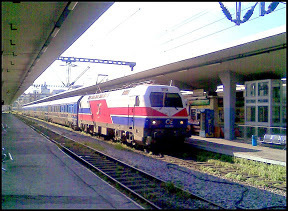
Thessaloniki Railway Station where I just missed catching ‘The Friendship Express’
(by about a month).

With my wife, Albana, and son Hanniel, 6, in Galicitsa Park, F.Y.R.O.M.
September, 2014.
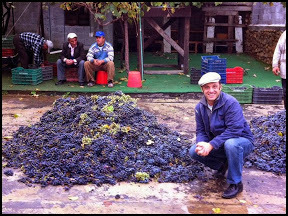
Gathering the grapes in a church yard, Albania.
Me, September, 2014.
By this author: The Silencer

Doing table top research on the Ataturk Boulevard, Istanbul,
just watching...
(Here Sheref Dushman meets contacts and prepares to depart for Greece from Sirkeci Railway Station.)
During the field research I discovered that the 'Friendship Express' service between Istanbul and Thessaloniki had stopped altogether just a month before I wanted to take it. So I had to work out an alternative way of experiencing the journey Sheref makes. My wife and I found a coach trip for Istanbul from Albania on Women's Day 2011, and travelled roughly along the same route through the night, at times parallel to the railway lines. The excursion degenerated into chaos in Istanbul, though, as the passengers complained and demanded their own personal itineraries be met, and the organisers, who had had enough of them, dumped them all in vexation! Caught in the middle of it, we ended up locked inside the coach for over two hours. But that said, I was still able to do what I had set out to. I would have loved to have taken the train. As an aside, it is the first section of the route Bond travels with Tatiana Romanova and the 'SPEKTOR' machine in Fleming's 'From Russia With Love'.

Thessaloniki Railway Station where I just missed catching ‘The Friendship Express’
(by about a month).

With my wife, Albana, and son Hanniel, 6, in Galicitsa Park, F.Y.R.O.M.
September, 2014.

Gathering the grapes in a church yard, Albania.
Me, September, 2014.
By this author: The Silencer
Published on December 04, 2014 02:40
•
Tags:
albania, from-russia-with-love, greece, ian-fleming, istanbul, ohrid, orient-express, sirkeci, the-friendship-express, thessaloniki, turkey
Macedonian Migration
Went to the Idomeni refugee/migrant transit camp on the Greek border with FYR Macedonia yesterday, which receives thousands of people per day on route for Germany and northern Europe. We drove the 600km round trip to give them our gifts of 90 litres of water, plastic sheeting for 19 families, medicines and a big sack of shoes. Here’s a snap. We had a blessed day!
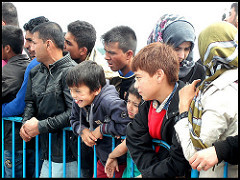
http://www.bbc.com/news/world-europe-...
‘Arrests have been made in the breaking of a people-smuggling gang by the French police in Calais, reports the Daily Mail. It’s believed to have smuggled 100 Albanian nationals into the UK, transporting them by boat to remote coves on England’s south coast between Weymouth and Plymouth…’ As such stories emerge, find out more about life in Albania through ‘The Silencer’; a novel set both there and in the UK.
https://www.goodreads.com/book/show/1...

http://www.bbc.com/news/world-europe-...
‘Arrests have been made in the breaking of a people-smuggling gang by the French police in Calais, reports the Daily Mail. It’s believed to have smuggled 100 Albanian nationals into the UK, transporting them by boat to remote coves on England’s south coast between Weymouth and Plymouth…’ As such stories emerge, find out more about life in Albania through ‘The Silencer’; a novel set both there and in the UK.
https://www.goodreads.com/book/show/1...
Published on October 01, 2015 05:45
•
Tags:
albania, calais, greece, macedonia, migration, people-smuggling, united-kingdom
Bringing smiles to the child refugees held in a toilet paper factory
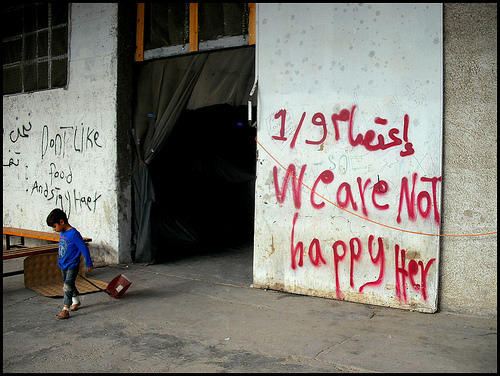
Words and photos by Paul Alkazraji.
At a refugee camp in a former toilet paper factory in northern Greece, a team of volunteers from an Albanian church has been bringing a little happiness to those trapped in the difficult living conditions.
In the ‘Softex’ camp on the industrial periphery of Thessaloniki, over a thousand mostly Syrians have been hastily accommodated after an informal camp at Idomeni, near the Macedonian border, was closed in May.
It is one of many where some 57,000 refugees are now held in official government camps throughout Greece, in a measure aimed at dealing with Europe’s huge migration crisis after border fences were hastily built and the Balkan migration route closed.
Teams from The Kennedy Foundation in Albania have been making weekly runs here since the spring to bring children’s activities including face painting, action games and a bouncy castle. Under the umbrella of volunteering organisation InterVolve, they also bag up and distribute fresh vegetables tent by tent up to 600 portions a day.
Many of those tents have been erected inside the ‘Softex’ factory to provide additional shelter from the none-to-distant winter. In the gloomy darkness children push each other around in rickety prams and play with broken bricks. There are makeshift street stalls, coffee shops and flat-bread bakers, and it has all the aromas both sweet and foul of a Damascus souk.
Though attempts have been made to improve the comfort of those stuck here in limbo, and NGOs and other inter-governmental agencies are present, there are reports that women and children have been afraid to leave their tents after dark for fear of sexual assault from other refugees.
“When we first came here, I saw they were living in bad conditions, and if you’d asked me to enter, I would not,” says Kennedy team member Klaus Kalemi. “But I did because I wanted to help. I feel terribly sorry for what has happened to them. They came from war and we should have better places for them. I think that all of them were hoping for a better future, because I saw the writing on the walls here everywhere.”
Klaus and others in the Albanian team communicate with the Arabic words they’ve learned, and face paint and manicure all those who come to them. “I saw that the children were smiling and happy and kept calling us ‘fri-ends’, even though I was here for the first time,” he says. “That was really touching. They knew the sign on my shirt. It has the word ‘hope’ written on it, and everyone who saw it knew the meaning.”
One small boy, Mohamed, from Deir ez-Zur in eastern Syria, was very happy with his Spiderman face paint design. He was in the camp with his parents, two sisters and four brothers. “We came at night in a boat. It had a motor and there were no waves. In the morning we were in Greece. I did not see any fish,” he said.
Kennedy team leader Lysiena Topi says: “When I heard about the situation, I thought I had to do something. I loved these people when I first met them in Idomeni. You can see in their eyes that they just need some attention, to see that people love and care about them.”
“One of the most needed things in the camp is something for the children,” she says. “You can see them fighting because they don’t have anything to do. When we went in, at first the managers would say to us, ‘Okay you can try!’ But after we had finished the festivals, they would say, ‘You are an amazing team. We don’t know how you do it. These kids love you!’ We see the smiles in their eyes...”
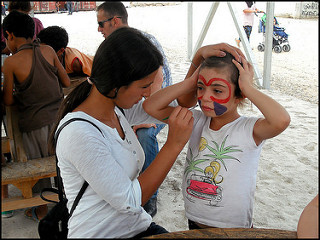
Written for ASSIST NEWS.
By this author:

Published on October 20, 2016 10:07
•
Tags:
child-refugees, greece, migration, softex-factory, war-in-syria
'The Migrant' to be published soon...
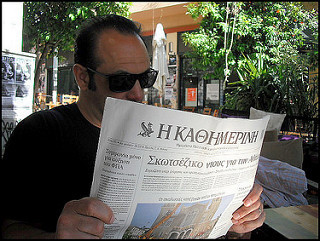
Some good news to share… I’m very happy to say that I just signed with a UK publisher for the novel I’ve been working on for a couple of years now – and finished, well, more or less. All being well, that should be out early next year. Hurray! (The photo is of me doing research for the story in Athens two years ago – well, pretending to read a Greek newspaper actually :) )
Early draft blurb for 'The Migrant' (working title).
‘No one has heard from Alban since he set off through the Albanian mountains to seek work illegally in Greece. Pastor Jude Kilburn is growing increasingly concerned. Could something have happened to the youth on route in the border forests? Could he remain safe in the Athens underworld if that was where he’d gone?
As the anti-austerity riots of 2012 explode, and the populist ‘Neo-Hellenic Front’ marches through the Greek capital, Jude gathers the help of two incompatible friends and sets off to find Alban. With him are Albanian Secret Service man Luan Gurbardhi, and reformed ex-criminal Mehmed Krasnichi. But can Jude keep his search party from falling apart?
When Donis Xenakis, a Greek riot-policeman and ‘Neo-Hellenic Front’ sympathiser, gets caught up in a diabolical plot to attack migrants, Jude could never have anticipated the unimaginable danger Alban is in. Nor can he foresee how a trafficked girl there will change all their outcomes.
‘The Migrant’ is a tense and evocative ‘road adventure’ with a powerful message and a tragic, yet ultimately redemptive, twist.’
Publisher: ‘Instant Apostle’.
Previously by this author:

Published on August 04, 2018 13:59
•
Tags:
2012, albania, anti-austerity-riots, athens, economic-crisis, greece, migration
Road trip with 'The Migrant'
A case of mistaken identity
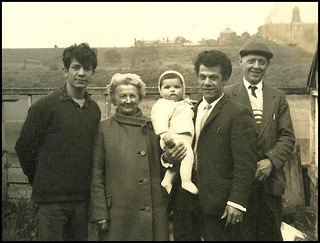
As I cycled along a city ring road once, my saddle was grasped from behind. A youth on a bike with cow horn handlebars scraped his shoe along the tarmac as he dragged us both to a standstill. He simply stared at me.
“What do… you want?” I said. He didn’t offer a word. His fist then slammed into my nose. He yanked back on his cow horns and wheelied off.
In the wake of the Black Lives Matter protests following the death of George Floyd, many previously silent people have given voice to their own experiences of racism. Like other mixed-race children growing up in England, I too felt a measure of it.
Another time, when I found a school door was locked, I tapped on the glass at a passer-by to let me in. He opened the door, showered me with a face full of spittle, locked it again and walked off. Sometimes, motives for actions were not stated; on other occasions, however, they were verbalised with venom.
I was aware then, though, that many English children were mistreated, often worse than me, for being different in some other way. Though my own experiences hurt, they were far outweighed by the friendship, help and affirmation I received from others in England as I grew up. Everyone needs to learn to forgive those who sin against them, as our own thoughts, words and deeds against others are forgiven.
When as an adult I moved to live and work with the church in Albania, I experienced racism from another angle: how some Greeks view those from their neighbouring country. When one Greek filling-station attendant eyed my Albanian car registration plate, I was actually refused petrol. I am stopped and questioned constantly by the Greek police on motorways, at road-toll stations and in supermarket car parks. Then, a cheerful ‘good morning’ and an offering of my British passport noticeably changes their attitude and my treatment.
This brings its own particular feeling of mistreatment: of being mistaken for something you know you are not. It perhaps gets to the crux of the matter: being seen as inferior, less human, potentially criminal even, on the basis of a wrong assumption. It has certainly made me more sympathetic to Albanians.
Many of these incidents of ‘mistaken racism’ were reworked into a novel I wrote called ‘The Migrant’. It tells the story of an Albanian youth who sets off to Greece in search of work and a better life, and three friends who set off to Athens to find him. There they encounter police brutality and casual racism on the roads, as well as populist rallies and organised attacks by a resurgent far right group.
On their way home, as the characters lament such struggles, they talk of a time and place where people of every race and nation will be welcomed and equally valued: where there will be no more crying and pain. Until then, there is longsuffering for so many, but it is eased with a sweet and certain hope that this place is prepared for us - and that we will get there.

'Racism... that's illogical captain!'
Paul Alkazraji's novel ‘The Migrant’ is published by Instant Apostle.
Find copies of ‘The Migrant’ here: https://www.amazon.co.uk/gp/product/B...

'The Migrant' Novel - Q and A
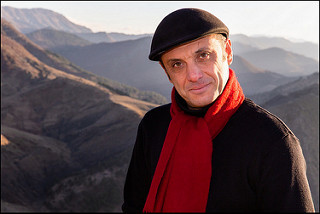
The author Paul Alkazraji in the Albanian mountains
close to the border with Greece. Pic: Andrew LaSavio.

Where does the story begin?
In the spectacular forested mountains bordering Albania and Greece, close to Little Prespa Lake, at dusk. A young Albanian man, Alban, and his friend, sneak past a watchtower to enter Greece illegally in search of work, but they are spotted by a border guard and a chase to catch them begins.
What is the story about?
It is about a pastor, Jude Kilburn, who takes on the responsibility to care enough for another person in his village, the young man, Alban, that he is ready to go the extra kilometre, over 500 of them in fact, to Athens to see if he is safe.
What happens in Athens?
Jude arrives in the Greek capital as dangers all around Alban are building - violent anti-austerity riots, the rise of far right political groups and racist attacks, the clutches of a trafficking gang, and a cynical police operation - then races against time to find him.
Did you personally make the journey in the story from Albania to Athens?
Yes, I drove down through Greece myself in an old Mercedes with two companions to experience the sights and sounds of the country, past Mount Olympus and Delphi. I then spent time in central Athens, in Plaka and Exarcheia, so I could evoke a keen sense of time and place as a backdrop.
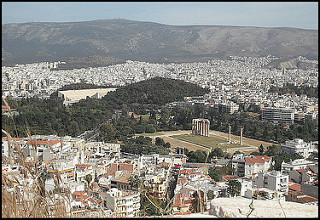
The view across Athens from the Acropolis.
What inspired you to write it?
I have worked for some years in Albania, and seen first-hand the struggles and risks many Albanians face to escape poverty and unemployment and find work abroad. It is, in a way, their story I am telling.
What are its themes?
It deals with people searching for a better life, without poverty or violent conflict, with migrants of the recent mass-movements up through southern Europe, and with dreams that turn sour. It deals too with where our final hope lies for finding such a destination of prosperity and peace.
Do you have a favourite scene from the book?
There are scenes on the Acropolis and in the middle of a riot in Syntagma Square and more that I hope are vivid enough to immerse the reader totally in energy of the moment.
Do you have a favourite minor character?
Some of them would be ‘Che’ Chaconas the anarchist, Granit Korabi the criminal gang member, and Stavros ‘The Big Man’ and Neo-Hellenic Front member. But the protagonist, Jude, the pastor who takes on the search for Alban, has more of my personal empathy.
Do you have a favourite sentence from the book?
The life of the poet Lord Byron has parallels with Alban’s life, and I have quoted him a few times. This one from ‘Don Juan’ is a favourite: ‘Between two worlds life hovers like a star, twixt night and morn, upon the horizon's verge.’ It sums up the story.
Can we guess the ending?
There is a kind of justice in what happens in the epilogue. Originally, it wasn’t planned that way, so I didn’t! The scene was added later. But maybe you will guess it?
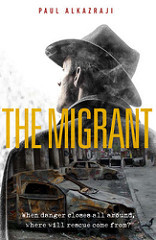
Amazon links to 'The Migrant':
UK: https://www.amazon.co.uk/Migrant-Paul...
US: https://www.amazon.com/gp/product/B07...

